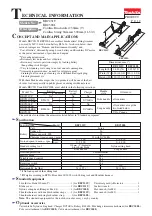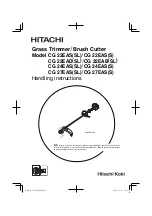
30
GB
Cutting Techniques
• Cut thick branches beforehand using
a branch clippers.
• The double-sided cutter bar enables
cutting in both directions or, with a
swinging action, from one side to the
other.
• In case of vertical cutting, move the
hedge trimmer uniformly forward or up
and down in an arc movement.
• In case of horizontal cutting, move
the hedge trimmer in a sickle-shaped
movement to the edge of the hedge,
so that cut branches fall to the ground.
• In order to achieve long straight lines,
the placing of tensioned guiding cords
is recommended.
Cutting Shaped Hedges:
It is recommended
that hedges be cut
in a trapezoidal
shape, in order to
prevent stripping off
of the lower branch-
es. This corresponds
to the natural plant
growth and allows the hedge to thrive opti-
mally. During cutting, only the new annual
growths are reduced and thus a dense
branching and a good screen will develop.
• Cut the sides of a hedge first. To do
this, move the hedge trimmer in the
direction of growth from bottom to top.
If you cut down from the top, the thin-
ner branches will move out, which may
result in some areas having sparse
growth or holes.
• Cut the top edge, according to taste,
in a flat shape, roof shape or rounded
shape
• Trim young plants to the required
shape. The main growth should re-
main undamaged until the hedge has
reached the planned height. All other
shoots are lopped off to half size.
Care of Free-Growing Hedges:
Free-growing hedges are not shaped when
cut, although they must be regularly main-
tained so the hedge does not become too
high.
Cleaning and Maintenance
Repair and servicing work not
described in this manual should
always be carried by our Service
Centre. Use only original parts.
Turn off the appliance and, before
doing any servicing, remove the
battery.
Wear gloves when handling the
safety knife bar. This will protect
you against cuts.
The following cleaning and servicing
should be done regularly. This will ensure
a long and reliable service life.
Cleaning
Do not spray the appliance with
water and do not immerse it in
water. Electric shock hazard!
• Keep clean the ventilation slots, motor
housing and handles of the appliance.
Use a damp cloth or a brush.
Do not use cleaning agents or sol-
vents. You may otherwise irreparably
damage the appliance.
Summary of Contents for CH 1800 Li
Page 2: ...2 2 1 4 3 5 6 7 8 7 4 5 12 9 12 11 11 15 10 10 9 9 14 13 9 10 10 ...
Page 130: ......
Page 132: ......
















































